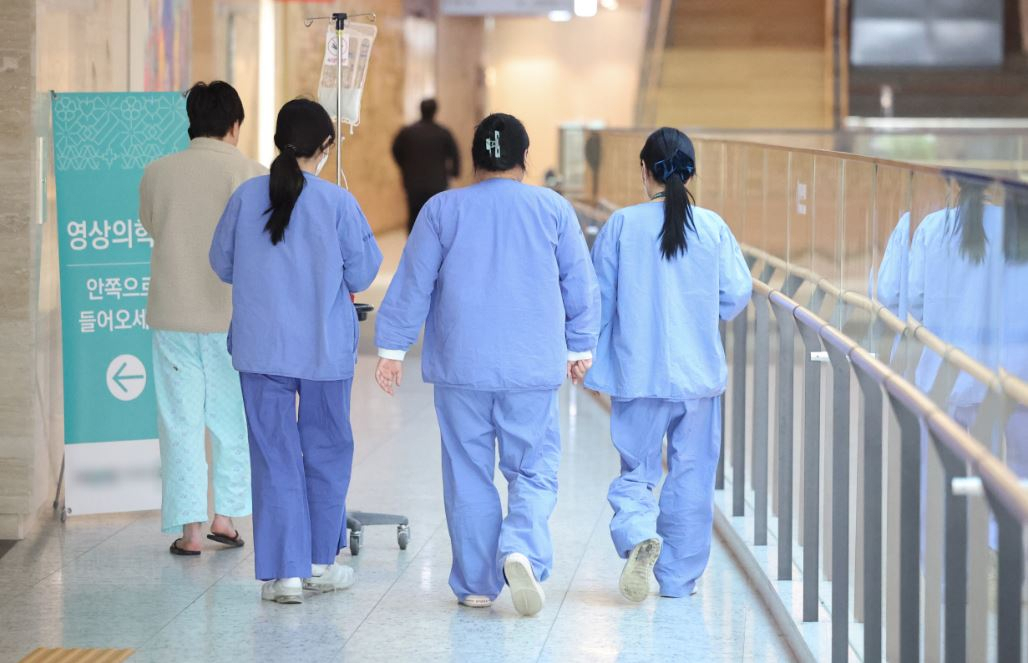Is S. Korea violating ILO rules in fight against junior doctors?
By Son Ji-hyoungPublished : March 10, 2024 - 18:32

Amid the ongoing standoff between the South Korean government and medical professionals, a new criticism has been raised from within medical circles that the back-to-work order imposed on junior doctors in teaching hospitals violates international labor standards.
The doctors' walkout in South Korea began in mid-February as a boycott of the government's plan to increase the medical school enrollment quota by at least 2,000 places each year, from 3,058.
As of Thursday, nearly 12,000 junior doctors, or 93 percent of all nationwide, had left their workplaces, according to the latest government estimate on Friday. Since last week, the government has been sending out notices to doctors who defied the administrative order to return to work, threatening to suspend their medical licenses.
Medical circles here said such an order violates the International Labor Organization's Convention No. 29, also known as the Forced Labor Convention, which is designed to ban any entity from using forced or compulsory labor. Protesting doctors say the government has been restricting their free will to start or quit their jobs, and it forced doctors to stay at work without convincing evidence proving that the country is facing a medical crisis.
The government instantly refuted the claim, quoting an exceptional clause of the ILO rule that doctors' resignation en masse is subject to "endangering the existence or the well-being of the whole or part of the population."
Forcing doctors to work is acceptable as the population would be on the verge of a medical crisis otherwise, even with a series of stopgap measures, the government claimed.
Jeong Byung-wang, a senior official of the Health Ministry in charge of health care policy said on Thursday that the government ought to restore medical services with back-to-work orders, and that it was seeking criminal charges against those who led the massive walkout, claiming they have allegedly violated the Medical Services Act here.
The ILO, a specialized agency of the United Nations, has yet to openly endorse the position of either the government or the protesting doctors. The agency, however, has a long history of intervening in the Korean government's policies regarding workers' rights with a December 2022 case being the most recent example.
At that time, the ILO sent an official letter to the Yoon Suk Yeol government to "immediately intervene" in Seoul's administrative order that forced cargo truckers to return to work. They protested against a planned removal of safe freight rates.
The government played down the agency's move saying it was "a simple request for an opinion made on a customary basis." The truckers' strike ended in 16 days, leaving behind at least 3 trillion won ($2.3 billion) in economic losses by disrupting the national logistics system.
Junior doctors, meanwhile, have argued that there is no association either representing or masterminding those who walked out. Instead, they argued they all resigned voluntarily. There is no legal precedent in Korea that states the act of quitting a job is an admitted refusal to a back-to-work order.
In late February, some junior doctors reportedly sought advice from the ILO over whether the government's action against the junior doctors' resignations could be deemed a violation of Seoul's ILO Convention, which came into force in the country in April 2022. The ILO was not immediately reached for comment on the matter.
Whether the government's order constitutes a violation of the ILO rules appears to be open to interpretation.
A legal expert in Seoul, quoted by Yonhap News, stated that the government's refusal to accept the resignations itself is seen as "forced labor," thus constituting a violation of international standards. Another contradictory idea is that Seoul's order does not constitute a violation of the ILO rule because junior doctors are, by nature, not subject to forced labor.
The health ministry, meanwhile, said it would deploy 20 combat medics and 138 public health doctors to fill in the medical void at 20 medical institutions. Moreover, a combined 316.7 billion won from the state budget reserve and public health insurance fund will be spent to ward off crisis.
The Yoon administration has touted the quota hike as a crucial step to addressing the excessive workloads of medical interns and residents amid hospitals' chronic staffing shortage, especially in essential fields like emergency medicine.
In 47 general hospitals in Korea, trainee doctors accounted for 37.5 percent of all of some 23,000 doctors there. These trainee doctors worked 77.7 hours a week on average. Yoon said on Wednesday during a pan-governmental emergency meeting, it is imperative to "upset the hospital operation structure" of general hospitals heavily relying on trainee doctors to sustain their operations.




















